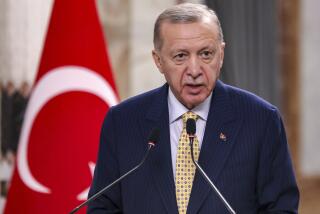Roles in Trade Envisioned for ‘Four Dragons’ : But Asian Officials Cool to Idea to Join Group
- Share via
SEOUL, South Korea — Asia’s four “little dragons” are making such headway with their new economic muscle that a movement is underfoot, led by the United States, to include them in an exclusive international trade organization.
But Singapore, South Korea, Taiwan, and Hong Kong are not beating down the door to join the Paris-based Organization of Economic Cooperation and Development, a group founded in 1961 to promote world trade.
In Washington, a proposal to have Asia’s fastest growing economies join the OECD recently came from the House subcommittee on Asian and Pacific affairs.
But Asian officials claim that Washington is acting out of self-interest, hoping to open up the markets of the four, which last year accounted for nearly a quarter of the $137.34-billion U.S. trade deficit.
Japan, the OECD’s only Asian member, generally favors admission of the four, but European members, worried about penetration of their own markets, are believed to be less enthusiastic.
There are other complications: two of the dragons have reservations about membership and China claims sovereignty over the other two.
While early entry is unlikely, Asian officials said it was high time the 24-member group of non-communist developed nations struck some sort of deal with Asia’s so-called newly industrializing countries (NICs).
Major Trade Flows
“Combined, we are a force advanced countries can no longer ignore,” said Lee Yong-hee, a director at South Korea’s economic planning ministry.
The four have collective trade flows rivaling that of Japan. Their total merchandise trade volume, according to official statistics, was about $435 billion in calendar 1988, against Japan’s $452 billion.
In Paris, the OECD secretariat played down speculation on the four joining the group. “Any would-be applicant would have to be sure of gaining unanimous consent,” one diplomat said in Paris. “It is a fairly lengthy diplomatic exercise.”
Earlier this year, the OECD held informal talks for the first time with officials of the four Asian NICs. More informal dialogue is planned later this year.
While the Paris meeting did not broach the issue of the four joining the club, it opened a forum for them to coordinate economic policies with the industrialized world.
Patrick Lau, Hong Kong’s assistant director of trade, like his counterparts in Singapore, Taipei and South Korea, spoke guardedly on the subject of membership. “It is premature at this stage to talk about joining the OECD,” he said.
Both South Korea and Singapore are hesitant to assume the responsibilities of OECD members.
“The aim of being an OECD member is to share the burden in enhancing the world economy, but membership itself can be a burden,” Lee said. “We would have to allow completely free import and foreign exchange flows and give aid to the less developed countries,” he said. “Frankly, (South Korea) is not ready for that yet.”
Wants to Avert Trading Bloc
Singapore, while seemingly suited to OECD membership by its high-technology economy, clings to its independence.
“Singapore welcomes dialogue with (all) groups on economic issues but we don’t want to institutionalize a deal leading to a trading bloc,” said one official, who declined to be identified.
China’s claims of sovereignty loom over Taiwan and Hong Kong.
“Taiwan is willing to join any international body, including the OECD . . . but the short-term prospect of that is slim,” said San Gee, an official at the Chung Hwa Institution of Economic Research in Taipei. “Many countries are reluctant to help the island at the expense of their ties with China,” he said.
More to Read
Sign up for Essential California
The most important California stories and recommendations in your inbox every morning.
You may occasionally receive promotional content from the Los Angeles Times.













